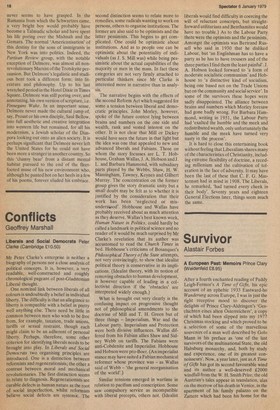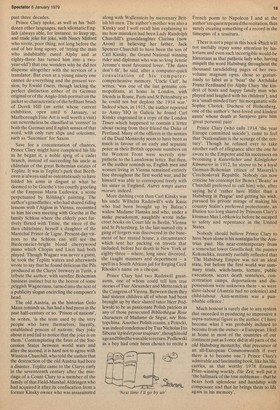Survivor
Alastair Forbes
A European Past: Memoirs Prince Clary (Weidenfeld £8.95)
After a fourth enchanted reading of Paddy Leigh-Fermor's A Time of Gifts, his epic account of an ephebic 1933 Eastward-ho Wanderung across Europe, I was in just the right receptive mood to discover the delights of Prince Clary-Aldringen's `Geschichten eines alien Osterreichers', a copy of which had been slipped into my 1977 Christmas stocking and which proved to be a selection of some of the marvellous souvenirs of a man well described by Gobo Mann in his preface as `one of the last survivors of the multinational State, the old Habsburg monarchy, and, both by study and experience, one of its greatest connoisseurs'. Now, a year later, just as A Time of Gifts has got its second favourable wind and its author a well-deserved £2000 windfall from the W. H. Smith Prize, the old Austrian's tales appear in translation, alas on the morrow of his death in Venice, in the apartment of his family palazzo on the Zattere which had been his home for the past three decades.
Prince Clary spoke, as well as his 'halfdozen other languages, such idiomatic English (always able, for instance, to keep up, and trade joke for joke, with Nancy Mitford who wrote, poor thing, not long before the end of her long agony, of 'trying the man who indubitably cured Alphy and at eighty-three has turned him into a twoyear-old') that one wonders why he did not dispense altogether with the services of a translator. But even at a young ninety one cannot do everything and the present version, by Ewald Osers, though lacking the perfect distinction either of its German original or of the Anglo-Irish portrait on the jacket so characteristic of the brilliant brush of Derek Hill (an artist whose current exhibition, open until 6 January, at Marlborough Fine Art is well worth a visit) can nevertheless be classified as 'correct' in both the German and English senses of that word, with only rare slips and solecisms, such as `Saxonian' for Saxon.
Save for a concatenation of chances, Prince Clary might have completed his life as he began it, a noble sprig of a cadet• branch, instead of succeeding his uncle as chatelain of the great Bohemian estates of Teplitz. It was in Teplitz's park that Beethoven is always said so ostentatiously to have folded his arms in disgust at what he deemed to be Goethe's too courtly greeting of the Empress Maria Ludovica, a scene perpetuated by Rollling's painting. The author's grandfather, who had shared riding lessons with l'Aiglon in Vienna, recounted to him his own meeting with Goethe at the family Schloss where the elderly poet furtively flirted with Titine, the niece of the then chatelaine, herself a daughter of the Marechal Prince de Ligne. Present-day visitors to the Schloss can still see the Biedermeier-bright blond cherrywood piano which Chopin and Liszt had both played. Though Wagner was never a guest, he took the Teplitz waters and afterwards wrote to say that he found delicious the Pils produced at the Clarys' brewery in Turin, a tribute the author, with surefire Bohemian business instinct but to the horror of some priggish Wagnerians, turned into the text of a publicity slogan encircling the composer's head.
The old Austria, as the historian Gobo Mann reminds us, has had a bad press in the past half-century or so. 'Prison of nations', he writes, 'is the term used by the very people who have themselves, literally, established prisons of nations; they joke about it and fail to notice that the joke is on them.' Contemplating the fates of the Succession States between world wars and after the second, it is hard not to agree with Winston Churchill, who told the author that the destruction of the old Austria had been a disaster. Teplitz came to the Clarys early in the seventeenth century after the marriage of a Count Clary to a member of the family of that Field-Marshal Aldringen who had acquired it after its confiscation from a former Kinsky owner who was assassinated along with Wallenstein by mercenary British hit-men. The author's mother was also a Kinsky and I well recall him explaining to me how mistaken had been Lady Randolph Churchill's granddaughter Clarissa (now Avon) in believing her father, Jack Spencer-Churchill to have been the son of Carl Kinsky, the Grand National winning rider and diplomat who was so long Jennie Jerome's most favoured lover. 'The dates don't fit', he said, after a computer-quick consultation of his compute rcomprehensive memory. 'Uncle Carl', he writes, 'was one of the last genuine cosmopolitans, at home in London, with friends in Rome, Paris and St Petersburg so he could not but deplore the 1914 war.' Indeed when, in 1915, the author reported to Army 'HO in Galicia he found Carl Kinsky engrossed in a copy of the London Times which happened to contain a letter about racing from their friend the Duke of Portland. Many of the officers in the armies of the Dual Monarchy seem to have been as much in favour of an early and separate peace as their British opposite numbers on the Western Front were secretly sympathetic to the Lansdowne letter. But then, as the author reminds us, English men and women living in Vienna remained entirely free throughout the first world war, and he himself was able to correspond freely with his sister in England. Autres temps autres moeurs indeed.
More dashing even than Carl Kinsky was his uncle Wilhelm Radziwill's wife Kasia who had been brought up by Balzac's widow Madame Hanska and who, under a make pseudonym, naughtily wrote indiscreet books on Court life in Berlin, Vienna and St Petersburg. In the last-named city a gang of forgers was discovered in the basement of her rented house, a circumstance which sent her packing on travels that included, before her death in New York at eighty-three — where, long since divorced, she taught manners and deportment — a spell in a South African jail for forging Cecil Rhodes's name on a cheque.
Prince Clary had two Radziwill greataunts, one of whom could tell him true stories of Tsar Alexander and Metternich at the Congress of Vienna. Between them they had sixteen children all of whom had been brought up by their shared tutor Herr Podlewski to be as passionate Polish patriots as any of those persecuted Bibliotheque Rose characters of Madame de Segur, nee Rostopchina. Another Polish cousin, a Potocki, was indeed condemned by Tsar Nicholas Ito Siberia 'a pied et pour toujours' , thoughinold age and blin d he was able to return. Podlewski as a boy had once been chosen to recite a French poem to Napoleon I and at the author's re quest repeated the recitation, thus surely creating something of a record in the timespan of a tessitura.
There is not a page in this book Ohich will not usefully repay some attention by historians and even such incorrigible would-be historians as that patbetic lady who, having mispelt the word Habsburg throughout the thousand taradiddling pages of her two volume magnum opus, chose so gratuitbusty to label as a 'boar' the Archduke Franz Ferdinand (to Alphy Clary 'the kin dest of hosts and happy family man who played and laughed with his children'), and as a 'small-minded fury' his morganatic wife Sophie Chotek, Duchess of Hohenberg, one of the author's 'best-loved and kindest aunts' whose death at Sarajevo gave him 'great personal pain'.
Prince Clary (who calls 1914 'the year Europe committed suicide'), came to feel that 'Nationalism is the scourge of the century'. Though he refused ever to take another oath of allegiance after the one he swore to the Emperor and his successors on becoming a Kaiserlicher und Koniglicher Kammerer in 1912, he strove to be a loyal German-Bohemian citizen of Masaryk's Czechoslovak Republic. Nobody can now criticise his contempt for Benes ('Beanz' as Churchill preferred to call him) who, after saying he'd 'rather have Hitler than a Habsburg in Prague' and getting his wish, pursued his private mirage of making his country Stalin's preferred protectorate, an illusion too long shared by Princess Clary's kinsman Max Lobkowicz before he escaped to safety and repentance in the United States.
Nobody should believe Prince Clary to have been alone is his nostalgia for the Austrian past. His near-contemporary from a somewhat lower Gesellschaft, the painter Kokoschka, recently ruefully reflected that 'The Habsburg Empire was not an ideal state, but before the first world war summary trials, witch-hunts, torture, public executions, secret death sentences, concentration camps, deportations and dispossessions were unknown there — so were slave-labour (Austria had no colonies) and child-labour. Anti-semitism was a punishable offence.'
Much honour is surely dtte to any system that suceeded in producing so impressive a supra-national figure as the author. CI have become what I was probably inclined to become from the outset — a European. I feel at home in most of the countries of our continent just as I once did in all parts of the old Habsburg monarchy, that precursor of an all-European Commonwealth if ever there is to become one.') Prince Clary's admirable and fascinating book, like his life, carries, as that worthy 1978 Erasmus Prize-winning weekly, Die Zeit, well put it 'the hallmark of the true nobleman —that he bears both splendour and hardship with composure and that he brings them to life again in his memory'.































 Previous page
Previous page